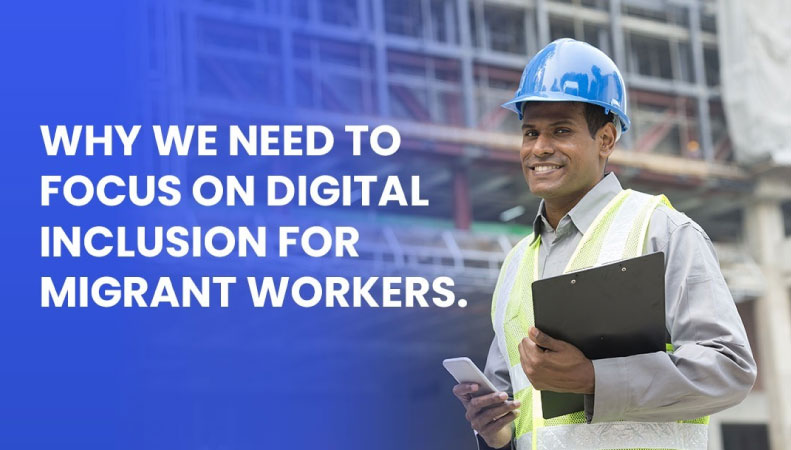
WHY WE NEED TO FOCUS ON DIGITAL INCLUSION FOR MIGRANT WORKERS
15th March 2021
Malaysia's performance in financial inclusion has been considered exceptional among middle-income nations. The efforts undertaken over the past two decades by the Malaysian authorities have promoted the development of an inclusive financial system. Most households in Malaysia now have access to a wide range of traditional and Islamic finance products and services and carry out electronic payments nationwide because of the favourable laws, innovation, the strengthening of the banking sector and the encouragement for all sectors to adopt digital payment systems.
Although Malaysia is on the path to becoming a high-income nation by 2020, there continues to be a lack of access to formal financial institutions and financial services for the increasing population of migrant workers and adults living in rural areas with low levels of education. However, new technologies have been generated through a combination of factors such as increased mobile usage, greater Internet connectivity, and increasing satisfaction of using technology. Fintech companies in Malaysia are combining financial services and technology, riding on growing demand and favourable climate that enables them to do so.
Around 3 million migrant workers employed in manufacturing, agriculture, hospitality, construction and household services live in Malaysia. These migrants are from Indonesia, the Philippines, Bangladesh, Nepal and India. Migrant workers are unbanked and, as a result, to make remittances to their families, they must rely on cash transfer agents or money exchanges for cross border payments. At the same time, the employers of the industries listed also face the challenge of paying cash wages. Instapay Technologies SdnBhd, introduced the Instapay app in May 2020 to resolve this widespread problem. The business has an e-money license with Bank Negara Malaysia (BNM) and has partnered with Mastercard to issue e-wallet-connected pre-paid cards.
Migrant employees get an e-wallet and Instapay by installing the Instapay app. This Mastercard allows them to remotely make remittances, mobile recharges and all forms of transactions, which is not only easy and time-saving but also safe.
The e-wallet also provides a remittance feature that is necessary monthly for migrant workers who are transferring money back to their loved ones. This is achieved through a collaboration with IME-Ria Money under BNM, a licensed remittance and money changer.
InstaPay is entering the space where Merchantrade is involved, where they also provide migrant workers with e-wallet and remittance services, and they have also recently added insurance to their service list. Technology has the potential to drastically reduce remittance costs and we want to make it easier for people at Instapay to manage their money, whether it's sending money to friends or loved ones or making payments using the Instapay Mastercard; all without incurring high costs or significant transaction fees that are often faced by low-income segments
The organization planned to use digital platforms actively to recruit both employees and employers, and a three-pronged strategy was developed by the Agency:
1- Channel & medium selection
2- Hyper customization of campaigns
3- Retargeting & lead nurture
Channel selection:
Both campaigns have been planned on two major platforms; Facebook and Youtube. Each workers’ culture has a few influencers or opinion leaders who have a major impact on the group's decision making. Instapay reached the opinion leaders of all key employee groups via Facebook and used them to increase brand and product awareness. Through promotions on LinkedIn, they also communicate with employers.
Hyper customization:
Migrant workers are comfortable and often deal with video formats in their mother tongue. The app supports 10 languages; thus, every migrant group was viewed by the marketing team as unique and personalized all creatives, landing pages, call centre staff with the preferred languages of the employees.
They also ran campaigns the focuses on significant festivals from home countries and how InstaPay could easily help the workers send money back home so their families could celebrate these festivals.
Retargeting & lead nurture:
Lead consistency was preserved by the team by ensuring communication, relevance, etc. All non-converted leads were targeted via digital content that provided them with additional product details and to keep them interested.
FinTech - from enabling access to remittances to banking services
The costs for migrants to obtain, handle and pass money can be facilitated and lowered by financial applications, platforms and services. One of the most significant needs for social integration, economic development and stability is access to banking and payment services (as opposed to cash, which is usually connected with informality and insecurity). Mobile technology, one of the most significant sources of income for many migrant families, may also help remittances. Given that the average cost of remittances is estimated at 7% of the amount transferred, FinTech may be an opportunity to meet the Sustainable Development Goals' 3% target for 2030.
For migrant workers, the opportunity to send money home is important, but not always convenient. Many problems are facing migrant workers that go beyond language barriers and acclimatizing to new environments. Many of these employees have little knowledge of handling their money using technology. Seventy-seven% of the Filipino population is unbanked, making it even more demanding to get money into the hands of loved ones while working away from home.
Fintech innovations have not only overcome many of these problems, but they have also created opportunities for financial inclusion and empowerment for migrant workers. However, it can be daunting to transition from a cash-based economy to a digital one. As a consequence, Fintech firms face the challenge of building a product that will appeal to customers around the world. It should not be addressed with a one-size-fits-all mindset to innovate and find new ways to be of value to varied, special users. Fintech businesses need to be versatile and ready from the outset to iterate, adapt and shape products for a variety of cultures, societies, and types of use.
EVOLET is a digital wallet app for migrant workers.
Learn more at https://evolet.io/
